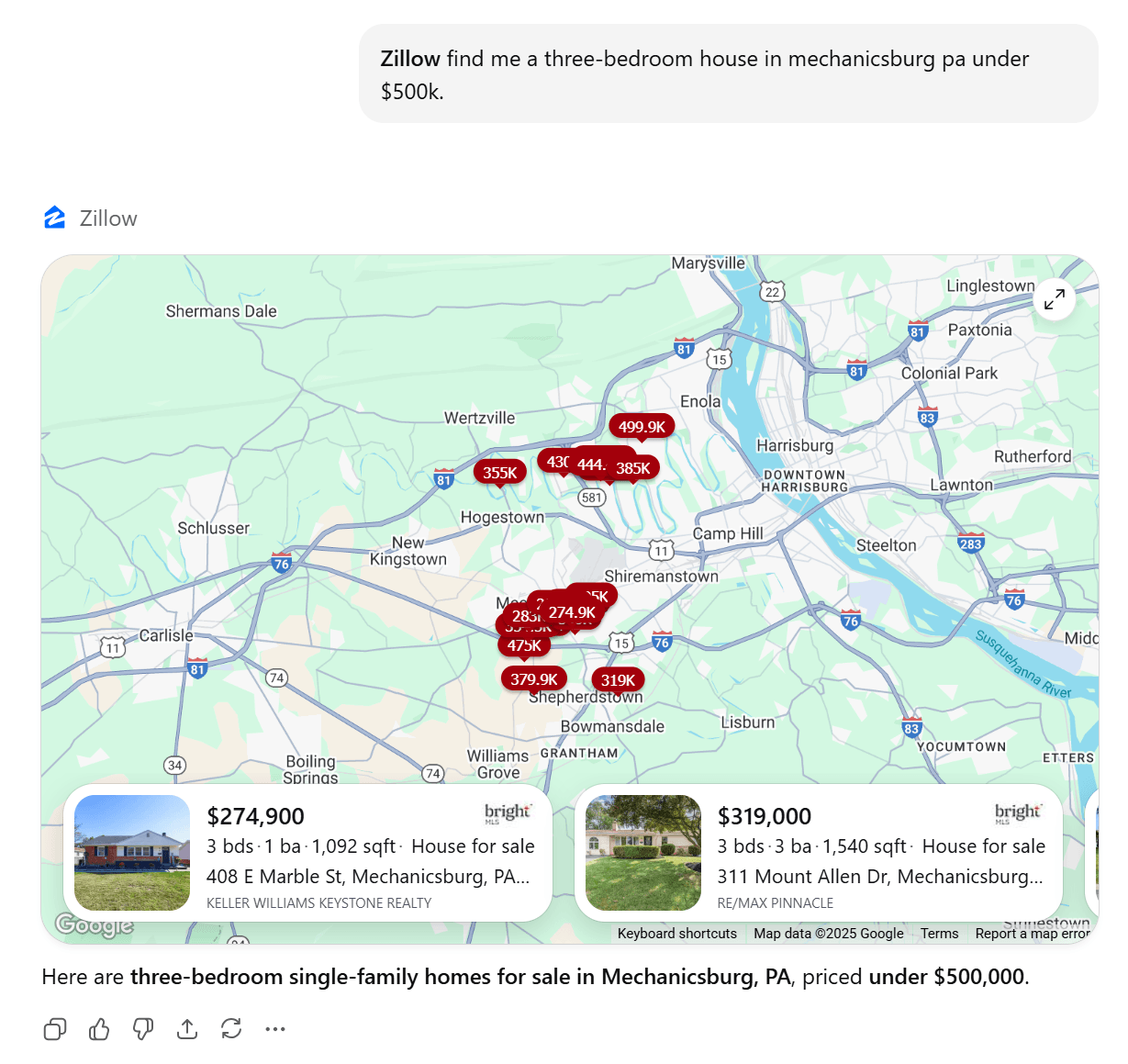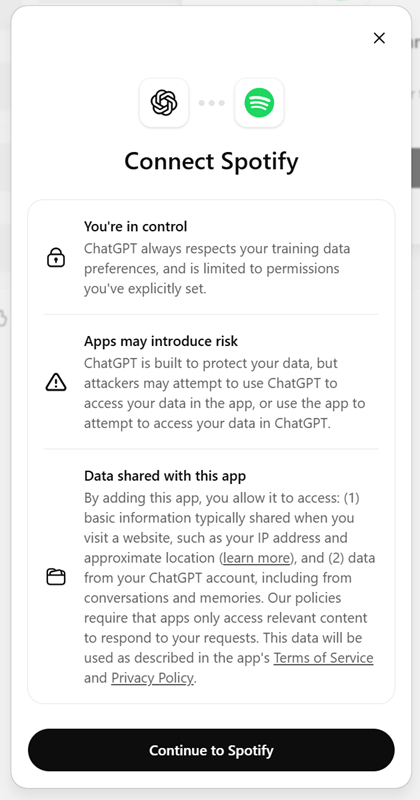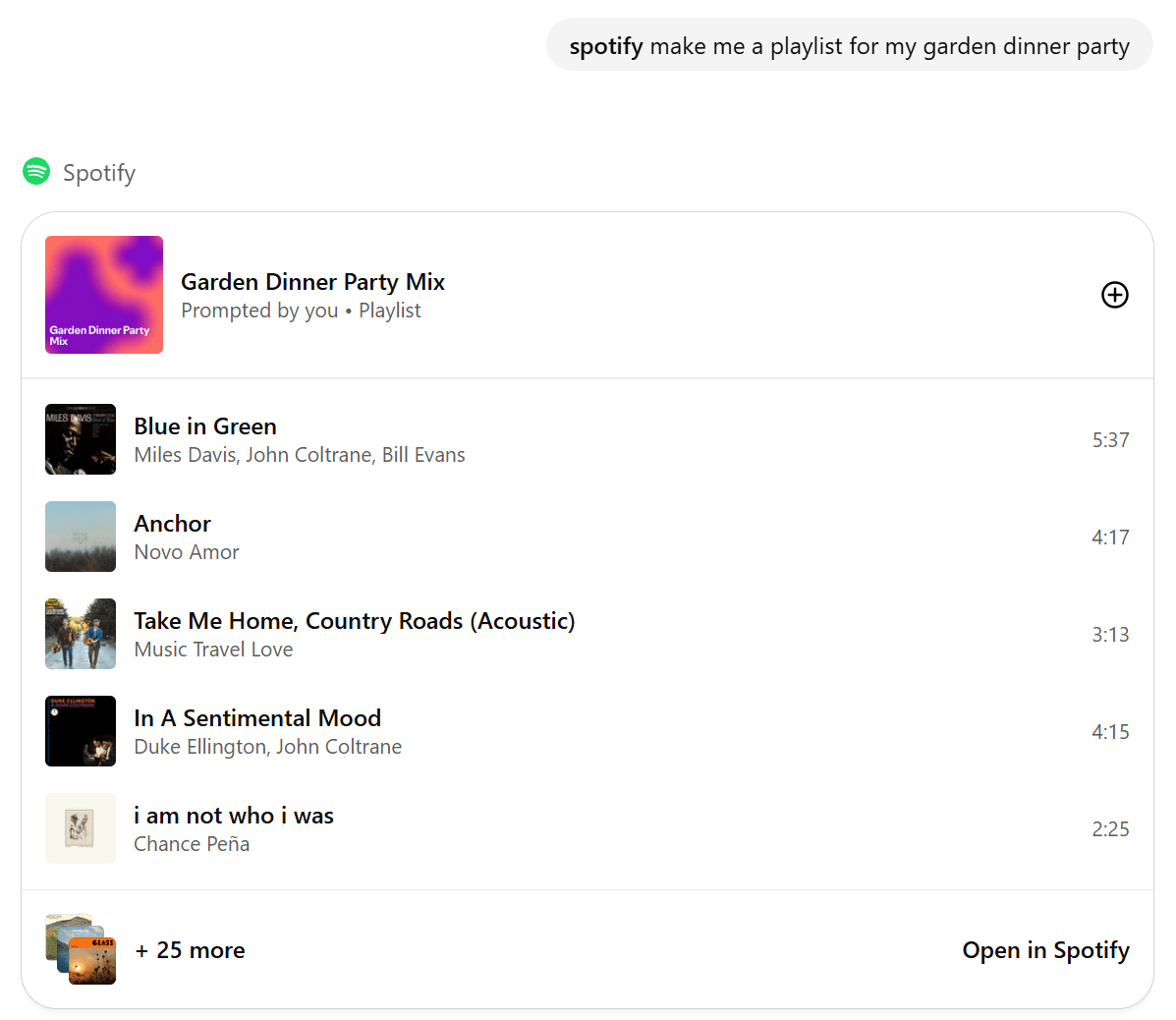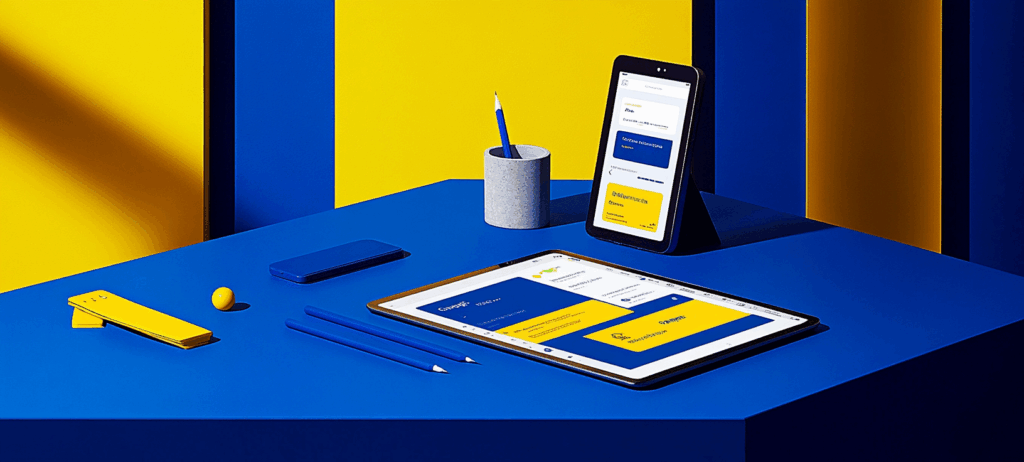-
 Published: Oct 6, 2025
Published: Oct 6, 2025
-
 8 min. read
8 min. read
-
Summarize in ChatGPT
-
 Emily Carter, M.S.
Emily Carter, M.S. Sr. Content Team Lead
Sr. Content Team Lead
- Emily Carter is the Sr. Content Team Lead at WebFX, where she leads the creative team behind the company’s website, blog, and email campaigns. With an M.S. in Digital Marketing and 10+ years of experience, she’s written and reviewed hundreds of articles on marketing, SEO, and tech, helping businesses turn complex topics into actionable strategies. Her work appears across WebFX and its brands, including SEO.com, Nutshell, and TeamAI, and has been featured by Social Media Today, HuffPost, and more. Outside the office, she’s usually road-tripping, hiking, or planning her next national park adventure. @emcarter16
Table of Contents
- What's new: OpenAI launches ChatGPT Apps & Apps SDK
- How to use apps in ChatGPT
- How ChatGPT Apps changes the game for users & marketers
- Inside the developer side: Apps SDK
- Early partners & what’s coming next
- Safety, privacy & review standards
- The bigger picture: What this means for marketers & businesses
- FAQs about ChatGPT Apps & the Apps SDK
- The next era of AI experiences
-
What are ChatGPT Apps?
ChatGPT Apps transform ChatGPT into a full app platform where users can interact with third-party services like Booking.com, Canva, Spotify, and Zillow through natural language without leaving the chat interface. -
How does the Apps SDK benefit developers?
The Apps SDK, built on OpenAI’s Model Context Protocol (MCP), allows developers to design both the logic and interface of apps, integrate with their backend systems, and create interactive chat-native experiences that can run anywhere MCP is adopted. -
What features will ChatGPT roll out for apps?
OpenAI plans to introduce a public app directory, monetization tools for developers, expanded access for Business and Enterprise users, and support for the Agentic Commerce Protocol enabling instant checkout within ChatGPT. -
How does ChatGPT suggest relevant apps?
ChatGPT uses contextual intelligence to recognize what users are working on and automatically suggests relevant apps at the perfect moment, like recommending Zillow when discussing moving or Canva when brainstorming presentations. -
What privacy protections exist for ChatGPT Apps?
Every app must comply with OpenAI’s usage policies, users receive prompts to review and approve data sharing before connecting to apps, and developers must include explicit privacy policies while collecting only necessary data.
What are ChatGPT Apps?
ChatGPT Apps is a new generation of apps, launched by OpenAI, that allow users to access third-party apps like Spotify and Zillow inside ChatGPT. The apps let you complete actions like designing slides, booking travel, browsing homes, or creating playlists without leaving the chat interface.
OpenAI just launched ChatGPT Apps and the Apps SDK, accelerating a marketing frontier where visibility, engagement, and commerce converge inside AI chat.
Users can now book trips, design presentations, or browse homes without ever leaving ChatGPT, while developers gain the tools to reach an audience of 800 million users.
In this post, we’ll explore what the ChatGPT Apps launch means for users, developers, and businesses as AI continues to change how we search, shop, and create in 2026.
- What’s new: OpenAI launches ChatGPT Apps & Apps SDK
- How to use apps in ChatGPT
- How ChatGPT Apps changes the game for users & marketers
- Inside the developer side: Apps SDK
- Early partners & what’s coming next
- Safety, privacy & review standards
- The bigger picture: What this means for marketers & businesses
- FAQs about ChatGPT Apps & the Apps SDK
What’s new: OpenAI launches ChatGPT Apps & Apps SDK
OpenAI has officially launched a new generation of ChatGPT Apps, transforming ChatGPT into a full app platform where users can seamlessly interact with third-party services through natural language.
Early partners like Booking.com, Canva, Coursera, Figma, Expedia, Spotify, and Zillow are already live, allowing users to design slides, plan trips, take courses, or browse homes without leaving chat.

Developers can start building today with the new Apps SDK, which extends the Model Context Protocol (MCP) to create both the logic and interface of an app. Later this year, OpenAI plans to roll out an app directory, monetization tools, and support for Business, Enterprise, and Edu users — effectively creating the first “app store” for AI conversations.
How to use apps in ChatGPT
Using apps in ChatGPT is as simple as starting a conversation. You can call an app by name (“Spotify, make a playlist for my dinner party”), and ChatGPT will bring it directly into your chat, using context from the conversation to assist. The first time you use an app, ChatGPT will prompt you to connect it and confirm what data it can access.
ChatGPT can also suggest apps when they’re relevant to what you’re discussing, like Zillow if you’re talking about buying a home. These apps blend familiar interactive features like maps, playlists, and slides with natural conversation, letting you brainstorm, design, learn, and act in one place.
As more developers build with the new Apps SDK, the range of in-chat experiences will continue to expand and appear when you need them most.
How ChatGPT Apps changes the game for users & marketers
ChatGPT is no longer just a chat interface. It’s becoming the operating system for your daily workflow. With apps now built directly into ChatGPT, you can move from idea to action without switching between tabs or tools. Whether you’re booking a trip, creating a design, or researching a topic, everything happens seamlessly inside one conversation.
What makes this experience powerful is ChatGPT’s contextual intelligence. The model can recognize what you’re working on and surface relevant apps at the perfect moment, like suggesting Zillow if you’re talking about moving, or Canva if you’re brainstorming a presentation. Each app adapts to your goals in real time, blending natural language with interactive features like maps, playlists, and slides.
ChatGPT apps blur the line between AI chat and productivity. It’s not just about asking for help — it’s about getting tasks done, faster and more intuitively than ever before.
For marketers and developers, the opportunity is twofold: Build apps that show up natively in user workflows and optimize your brand’s presence, so ChatGPT recognizes and recommends it. Success in this new ecosystem depends on visibility signals that go beyond traditional SEO — combining AI relevance, trust, and experience.
Inside the developer side: Apps SDK
Behind this new generation of ChatGPT experiences is the Apps SDK, a toolkit built on OpenAI’s Model Context Protocol (MCP) — an open standard that connects ChatGPT to external data, tools, and APIs.
The SDK expands MCP’s capabilities, allowing developers to design not just how an app works, but also how it appears and interacts within the chat itself.
With the Apps SDK, developers can:
- Design both the logic and interface of their apps to create interactive, chat-native experiences.
- Integrate directly with their backend set ups, enabling login and premium features for existing customers.
- Test apps in Developer Mode, previewing interactions and refining functionality in real time.
Because it’s open source, apps built with the SDK aren’t confined to ChatGPT. They can run anywhere MCP is adopted, paving the way for a broader ecosystem of interoperable AI experiences.
OpenAI has also released detailed documentation, design guidelines, and example apps to help developers get started. With these tools in hand, builders can begin experimenting today and shape what the next era of AI-powered, conversational apps will look like.
Early partners & what’s coming next
OpenAI’s first wave of ChatGPT app partners highlights the scale and versatility of what’s possible in this new ecosystem. Early integrations with Booking.com, Canva, Coursera, Expedia, Figma, Spotify, and Zillow are already live, offering everything from trip planning and home browsing to music discovery and design creation directly inside chat.
This is just the start too. The next wave of partners, including AllTrails, Peloton, OpenTable, Target, Uber, and others, will expand ChatGPT’s reach into fitness, dining, retail, and transportation. The Apps SDK is now open in preview, inviting developers everywhere to join early and shape a platform that’s poised to scale fast.
OpenAI isn’t stopping here. Over the coming months, ChatGPT will roll out features that bring the AI app ecosystem to full maturity, including:
- A public app directory where users can browse, search, and install ChatGPT apps.
- Monetization tools for developers to generate revenue from their creations.
- Expanded access for Business, Enterprise, and Edu users.
- Support for the Agentic Commerce Protocol, enabling instant checkout within ChatGPT.
These updates will position ChatGPT as the internet’s first large-scale App Store for AI, connecting users, businesses, and developers through conversation-driven experiences.
Now is the moment to prepare. Developers can start building with the Apps SDK, and marketers can begin planning how to bring their brand’s experiences into ChatGPT — before the next wave of AI adoption hits.
Safety, privacy & review standards
With this expansion comes a renewed focus on trust and transparency. Every app in ChatGPT must comply with OpenAI’s usage and partner policies, ensuring all experiences remain appropriate, safe, and aligned with community standards.
Before connecting to an app, users are prompted to review and approve what data is shared, reinforcing privacy transparency at every step.

OpenAI has also introduced clear developer requirements: Apps must include explicit privacy policies, collect only necessary data, and remain transparent about how it’s used.
Looking ahead, OpenAI plans to roll out more granular data permissions and monetization guidelines, giving users finer control and developers clearer pathways to sustainable app growth. A draft of the developer guidelines is already available, setting the foundation for a safe, responsible, and user-first app ecosystem.
The bigger picture: What this means for marketers & businesses
For businesses and marketers, this launch marks the rise of conversational commerce where discovery, engagement, and conversion all happen inside AI chat. Users won’t just search for information; they’ll complete actions directly within ChatGPT.
That creates major opportunities for brands to:
- Build utility-based experiences inside ChatGPT, like product quizzes, booking tools, or recommendation engines that solve user problems in real time.
- Optimize AI visibility, ensuring your brand is the one ChatGPT suggests when users are exploring relevant topics.
- Develop branded mini-apps that engage audiences contextually — appearing naturally in conversations where your product or service fits.
For marketers, this is the next evolution of discoverability — moving from SEO and ads to AI visibility inside conversations. The Apps SDK gives forward-thinking brands a head start in this new channel, rewarding those who move early to build interactive, AI-native experiences.
FAQs about ChatGPT Apps & the Apps SDK
What are ChatGPT Apps?
ChatGPT Apps is a new generation of apps, launched by OpenAI, that allow users to access third-party apps like Spotify and Zillow inside ChatGPT. The apps let you complete actions like designing slides, booking travel, browsing homes, or creating playlists without leaving the chat interface.

Who can use ChatGPT Apps right now?
As of launch, apps are available to all logged-in ChatGPT users outside the EU across the Free, Go, Plus, and Pro plans. OpenAI plans to expand access to Business, Enterprise, and Edu users later this year.
How do I use an app in ChatGPT?
You can start a message with the app’s name (“Spotify, make a playlist for my dinner party”) or let ChatGPT suggest one when it’s relevant to your conversation. The first time you use an app, ChatGPT will prompt you to connect it and review what data is shared.
Which apps are available today?
Early launch partners include Booking.com, Canva, Coursera, Expedia, Figma, Spotify, and Zillow, with more partners like AllTrails, Peloton, OpenTable, Target, and Uber coming soon.
What is the Apps SDK?
The Apps SDK is OpenAI’s developer toolkit for creating apps that run inside ChatGPT. Built on the Model Context Protocol (MCP), it lets developers design the logic, interface, and integrations of their apps — and even connect to their own backends.
How do you develop an app for ChatGPT?
Developers can start building today using the Apps SDK preview and Developer Mode in ChatGPT. OpenAI provides documentation, design guidelines, and sample code to help teams create and test apps. Later this year, developers will be able to submit apps for review, monetization, and listing in ChatGPT’s upcoming app directory.
Are ChatGPT Apps safe to use?
Yes. Every app must follow OpenAI’s usage and privacy policies. Before connecting, you’ll see what data is shared, and OpenAI plans to release even more granular privacy controls later this year.
How can businesses and marketers use ChatGPT Apps?
ChatGPT Apps create new opportunities for AI visibility and engagement. Businesses can build their own branded mini-apps or optimize their content to appear when ChatGPT recommends relevant tools.
The next era of AI experiences
The expansion of ChatGPT Apps and the Apps SDK accelerates a growing AI ecosystem where conversation drives how people create, learn, and buy online.
For users, this means a seamless digital experience powered by intelligent, in-chat apps that anticipate your needs. For developers, it’s an open invitation to shape the next generation of AI-driven interfaces. And for businesses, it’s a wake-up call: visibility is no longer limited to search results — it now lives inside AI conversations.
At WebFX, we’re helping brands stay visible in AI results — from building AI-ready content to exploring how your business can integrate with platforms like ChatGPT.
Connect with our AI strategists to future-proof your strategy and discover how your brand can show up and stand out in the new AI interface era.
-
 Emily Carter is the Sr. Content Team Lead at WebFX, where she leads the creative team behind the company’s website, blog, and email campaigns. With an M.S. in Digital Marketing and 10+ years of experience, she’s written and reviewed hundreds of articles on marketing, SEO, and tech, helping businesses turn complex topics into actionable strategies. Her work appears across WebFX and its brands, including SEO.com, Nutshell, and TeamAI, and has been featured by Social Media Today, HuffPost, and more. Outside the office, she’s usually road-tripping, hiking, or planning her next national park adventure.@emcarter16
Emily Carter is the Sr. Content Team Lead at WebFX, where she leads the creative team behind the company’s website, blog, and email campaigns. With an M.S. in Digital Marketing and 10+ years of experience, she’s written and reviewed hundreds of articles on marketing, SEO, and tech, helping businesses turn complex topics into actionable strategies. Her work appears across WebFX and its brands, including SEO.com, Nutshell, and TeamAI, and has been featured by Social Media Today, HuffPost, and more. Outside the office, she’s usually road-tripping, hiking, or planning her next national park adventure.@emcarter16 -

WebFX is a full-service marketing agency with 1,100+ client reviews and a 4.9-star rating on Clutch! Find out how our expert team and revenue-accelerating tech can drive results for you! Learn more
Try our free Marketing Calculator
Craft a tailored online marketing strategy! Utilize our free Internet marketing calculator for a custom plan based on your location, reach, timeframe, and budget.
Plan Your Marketing Budget
Table of Contents
- What's new: OpenAI launches ChatGPT Apps & Apps SDK
- How to use apps in ChatGPT
- How ChatGPT Apps changes the game for users & marketers
- Inside the developer side: Apps SDK
- Early partners & what’s coming next
- Safety, privacy & review standards
- The bigger picture: What this means for marketers & businesses
- FAQs about ChatGPT Apps & the Apps SDK
- The next era of AI experiences

See AI Marketing in Action
Explore how WebFX helped a regional brand get discovered in AI search experiences — proving what’s possible with today’s AI-driven marketing!

Proven Marketing Strategies
Try our free Marketing Calculator
Craft a tailored online marketing strategy! Utilize our free Internet marketing calculator for a custom plan based on your location, reach, timeframe, and budget.
Plan Your Marketing Budget
What to read next




